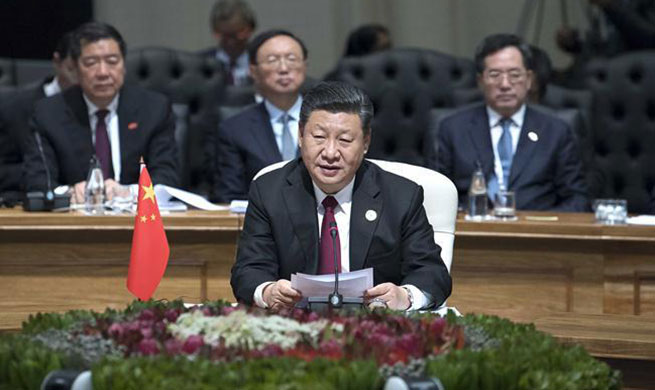NICOSIA, July 27 (Xinhua) -- Cyprus has won a landmark international arbitration related to the 2013 fiscal crisis and the resolution of the banking system that resulted in the winding down of the island's second largest lender, Cyprus Popular Bank, Attorney General Costas Clerides said on Friday.
He said that a ruling by the International Court of Arbitration (ICA) in Paris, set up by the International Chamber of Commerce, cleared Cyprus of any responsibility in the closing down of the bank and at the same time dismissed claims for compensation totaling almost 1.1 billion euros (1.28 billion U.S. dollars).
He added that the decision could be a landmark one, as it not only cleared Cyprus of considerable monetary claims, but it would also be considered a precedent in relation to other applications for arbitration before the court.
Legal experts said the decision will act as a firewall against court actions against the state of Cyprus by people who lost their money in the 2013 dual economic and banking crisis.
The case was brought before ICA by Andreas Vgenopoulos, a former strongman in Greece, who controlled large sections of the country's economy through his Marfin Investment Group (MIG), which included a bank, a shipping firm, a private hospital and Greece's former state airline, Olympic.
A former champion fencer and self-made businessman, Vgenopoulos died of a heart attack in November 2016.
He had claimed before ICA that Cyprus, by closing down the state owned Cyprus Popular Bank, commonly known as Laiki, had violated its obligations in a mutual investment protection agreement with Greece, resulting in the loss of his investment in the lender, and in the loss of investments by 19 other people and legal entities.
"The Court dismissed all arguments put forth by the plaintiffs and ordered them to pay Cyprus 5 million euros for legal expenses," Clerides said.
Vgenopoulos, a man of controversy who clashed with successive governments of Greece, was widely considered to be responsible for the collapse of Laiki.
He acquired the majority share of Laiki allegedly under dubious circumstances for which a former governor of Cyprus Central Bank is being tried for receiving 1-million-euro bribe from a Vgenopoulos shadowy firm.
Vgenopoulos led Laiki from 2006 to 2011 when the bank lost its capital and was acquired by the state which recapitalized it with 1.8 billion euros in 2012. The money pumped into the bank drained the public coffers and forced Cyprus to apply for bailout by the Eurogroup the same year, after the island was cut off from financial markets.
By that time many billions of euros were transferred to the Laiki's branches in Greece, which offered loans to friends and associates of Vgenopoulos, without adequate security, in order to invest in MIG shares.
At the height of the financial crisis, Laiki was wound down in March 2013 and folded into Bank of Cyprus, in what became the most dramatic episode of Cyprus's twin fiscal and banking crisis.
Shareholders lost their investment, depositors lost all their money above 100,000 euros and the value of high-return bonds held mostly by thousands of pensioners was wiped out.
Laiki also burdened Bank of Cyprus with a debt of over 9 billion euros in the form of Emergency Liquidity Assistance (ELA) offered by the European Central Bank. Investigations showed that most of the ELA money was tunneled to Laiki branches in Greece and vanished.
Vgenopoulos and several of his associates at Laiki were charged before a criminal court in Cyprus and a verdict was expected last month, after Vgenopoulos name was taken off the charge sheet following his death.
However, in one of the surprising twists that have become common during the unfolding of the Cyprus crisis, the court said this week that prior to a verdict it had to clear a point of law.
The accused argued that they should benefit from a lighter penalty following a change in the law after the events for which they had been on trial.













